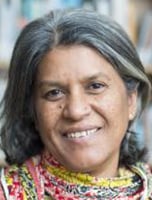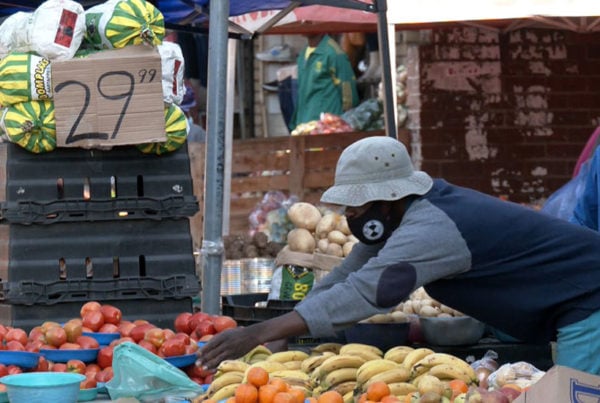Watch Short Films
Ghana
South Africa
Tanzania
The impacts of COVID 19 to food systems in Tanzania
Download Policy Briefs
A project on African food systems and Covid-19
PLAAS has conducted a one-year action-oriented research project entitled “The Impacts of Covid-19 Responses on the Political Economy of African Food Systems” to gather data on the impacts of Covid-19 regulatory and support interventions on the functioning and structure of food systems in Tanzania, Ghana and South Africa. These countries, representing diverse food systems and Covid-19 responses, provide for comparison and a breadth of lessons. We have generated rapid outputs of information and analysis, across formal and informal food systems, and package findings for policy, advocacy and academic purposes.
Three African women professors are co-leading this research:

Prof. Ruth Hall
PLAAS

Prof. Dzodzi Tsikata
Director, Institute of African Studies, University of Ghana

Prof. Moenieba Isaacs
PLAAS
Research partnerships
Our research is a collaboration between universities and civil society organisations. In Ghana, the Institute of African Studies at the University of Ghana is collaborating with the Network for Women’s Rights in Ghana (NETRIGHT). In Tanzania, Ardhi University is working with the Eastern and Southern Africa Small Scale Farmers Forum (ESAFF) and the Environmental Management and Economic Development Organization (EMEDO) which works with small-scale fishers and traders. In South Africa, PLAAS at the University of the Western Cape is working with the University of Pretoria, and with Masifundise Development Trust which works with small-scale fishers and traders and the Association for Rural Advancement Land Rights Advocacy (AFRA) which works with small-scale farmers, farm workers and traders.

What is our aim?
The overall aim of the project is to inform and influence African governments, development agencies, business and civil society in their responses to Covid-19 and future shocks, by investigating how their policies and practices affect and reshape different parts of the food system in three African countries, and bringing to the fore the voices, experiences, strategies and priorities of marginalised actors in the food system – especially women and small-scale farmers, fishers, traders, processors and retailers in the informal sector. Evidence and its dissemination will guide short and long-term interventions focussed on achieving the right to food, improved livelihoods within food systems and increased voice and agency for women, the economically marginalised and the systematically impoverished.
What’s the context?
Food systems in Africa were contested spaces before the Covid-19 pandemic arrived, with competing approaches to achieving the right to food. The total number of people going hungry had already been rising in sub-Saharan Africa even as some progress had been made in reducing the proportion of people food insecure (FAO, 2020). Covid-19 and responses to it are now delivering new severe shocks to food systems, impacting demand and supply in ways not yet well understood, almost certainly bringing lasting changes, and potentially leaving an additional 132 million people undernourished worldwide (FAO, 2020).

What are our research questions?
Our research questions are grouped under five themes:
- the nature of regulatory and other responses to the Covid-19 pandemic;
- the immediate impacts on formal and informal markets and food systems from production—farming and fishing—to consumption;
- the prognosis for longer-term structural changes in these food systems;
- who the winners and losers are and implications for equity and the right to food;
- the outcomes and options for voice and agency of those inside and depending on these food systems.
What are our specific objectives in this project?
- To monitor and analyse regulatory and support responses to Covid-19 as they relate to the food system.
- To collect and analyse real-time qualitative and quantitative data on the impacts on different elements of food systems and the livelihoods of food system actors, with a focus on women and marginal actors.
- To engage in dialogue, derive lessons and compile accessible and vivid information to inform and influence government, development agencies and responses from society.
- To make significant original contributions to scholarly knowledge on the impacts of Covid-19 responses on the political economy of food system change in Africa.
Why Ghana, South Africa and Tanzania?
The three countries that are the focus of this study cover a spectrum of different economies, food systems and Covid-19 responses. South Africa is an upper-middle-income country; Ghana a lower-middle income country, and Tanzania a low-income country. Urban populations are 66%, 56% and 35% respectively, and food systems range from smallholder-based and informal (Tanzania) to large-scale farming and highly supermarketized (South Africa). Ghana falls somewhere between these extremes, with smallholders as well as larger producers, and food retail that, while still mostly informal, is undergoing significant supermarket penetration.
South Africa and Tanzania exemplify opposite extremes in Covid-19 responses: The South African government swiftly instituted a far-reaching lockdown, intervened decisively in economic activity and trade flows, while the Tanzanian approach has verged on outright denialism. Between the two, Ghana’s government has emphasised community and primary healthcare, short-term and modest restrictions on movement and trade, and limited programme of financial aid and soft loans for producers, aggregators and processors.

Which food groups are we focusing on?
Our attention falls on four food groups: fresh produce; protein; staple carbohydrates; and ultra-processed products (UPPs). While the first three are standard fare for food systems research, we emphasise the fourth, based on our research collaborative study comparing South African and Ghana, on the spread of ‘obesogenic’ food environments and dietary transitions, as unequal countries shift towards formalised and concentrated food systems.

Who are we and what will we do?
The team comprises highly-experienced university-based researchers—in the fields of food systems, agrarian change and gender—combined with membership-based farmer and fisher organisations that have grassroots, national and international advocacy experience. Methods include food system mapping; collection of quantitative data on food flows, volumes and pricing; ethnographic field and online research, in-depth and key informant interviews, food system diaries via phone and Zoom interviews, WhatsApp messages and voice notes; photos and video material. Self-reporting through phone and online platforms will limit mobility and risk, and cost-effectively reach more sites. Dissemination of findings will include research reports, policy briefs, online audio-visual materials, and policy dialogues.
Civil society partners
- Association for Rural Advancement Land Rights Advocacy (AFRA)
- Masifundise Development Trust
- Network for Women’s Rights in Ghana (NETRIGHT)
- Environmental Management and Economic Development Organization (EMEDO)
- Eastern and Southern Africa Small Scale Farmers Forum (ESAFF)
University partners
Contact us
Organisations and individuals that are keen to engage with and support this work are welcome to contact the research team. We will be glad to hear from you. Contact us at info@plaas.org.za. For updates check this webpage periodically, and follow @PLAASuwc and #FoodCovid on Twitter.
Events


Funder
This project is generously supported by the International Development Research Centre (IDRC).


